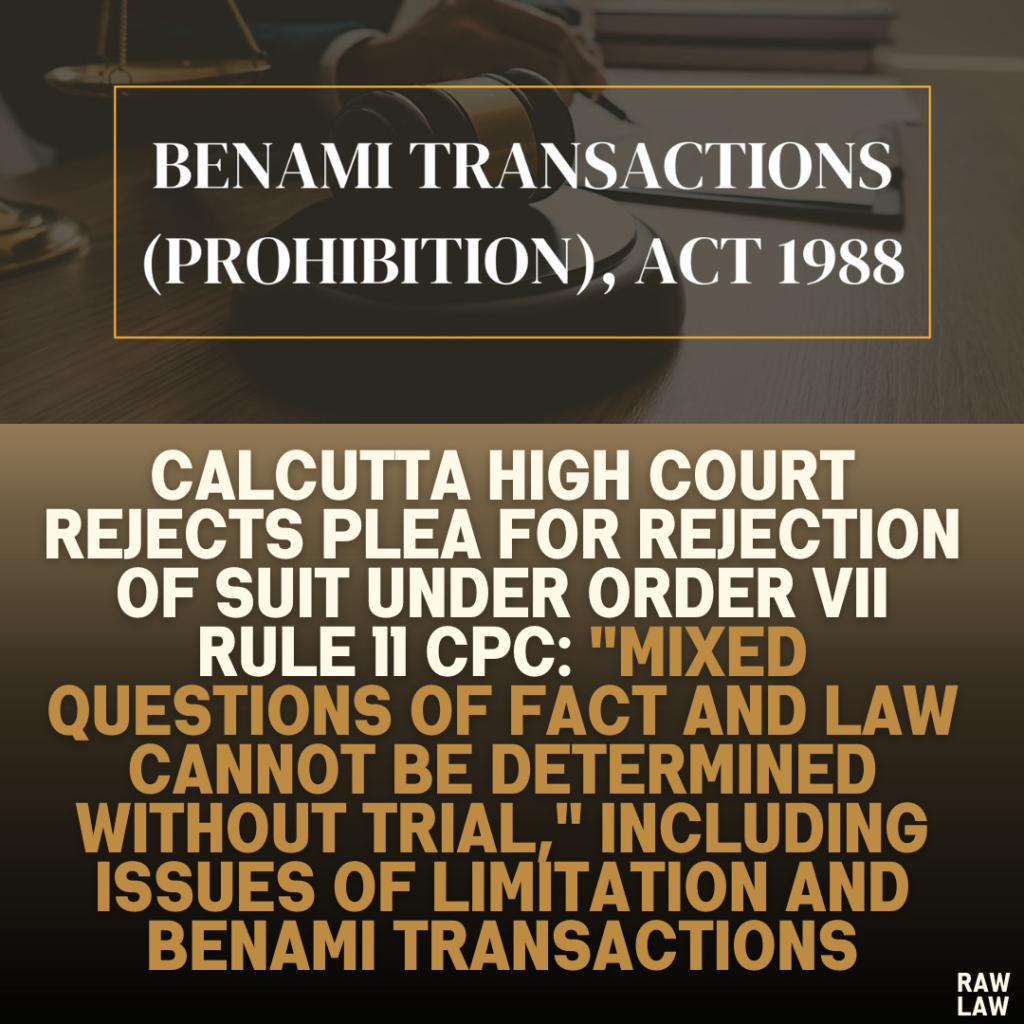Court’s Decision
The Calcutta High Court rejected a civil revision application challenging the lower court’s order that dismissed the petitioners’ plea under Order VII Rule 11 of the CPC. The petitioners had sought dismissal of the suit on grounds of limitation and the prohibition under Section 4 of the Benami Transactions (Prohibition) Act, 1988. The Court held that these issues involved mixed questions of fact and law, which could not be resolved without a full trial.
Facts of the Case
- The opposite party (plaintiff) filed a suit in 2018 seeking:
- A declaration of joint ownership of a property.
- Partition of the property.
- An injunction preventing interference in their claimed ownership.
- The petitioners (defendants) argued that:
- The suit was barred by limitation as the sale deed in question was executed in 1984.
- The claim of joint ownership was barred under Section 4 of the Benami Transactions (Prohibition) Act, 1988.
- The petitioners filed an application under Order VII Rule 11 of the CPC, seeking dismissal of the suit at a preliminary stage. The trial court dismissed this application, leading to the present civil revision application before the High Court.
Issues Before the Court
- Applicability of Section 4 of the Benami Transactions (Prohibition) Act, 1988:
- Does the plaintiff’s claim for joint ownership violate the statutory prohibition on claims over benami properties?
- Bar by Limitation:
- Was the suit barred by the law of limitation, given that the property transaction occurred in 1984?
Petitioner’s Arguments
- Bar by Limitation:
- The plaintiff had knowledge of the sale deed since 1984 but waited over 35 years to file the suit. This delay violated the limitation period prescribed by law.
- Benami Prohibition:
- The plaintiff’s claim that the property was purchased using joint funds is barred by Section 4 of the Benami Transactions (Prohibition) Act, 1988, which prohibits claims over benami properties.
- Precedent Support:
- Cited R. Rajagopal Reddy v. Radmini Chandrasekharan (1995): Section 4 does not permit claims by the real owner in a benami transaction.
- Cited Union of India v. Ganpati Dealcom Pvt. Ltd. (2023): Highlighted constitutional challenges to certain provisions of the Act.
Respondent’s Arguments
- Cause of Action and Limitation:
- The plaintiff argued that the cause of action arose only in 2017 when they discovered that the property had been transferred by the petitioners in 1993.
- Claimed that the suit was filed within the limitation period from this point of knowledge.
- Mixed Questions of Fact and Law:
- The issues of ownership and the nature of the transaction (benami or otherwise) required evidence and could not be decided merely based on pleadings.
- Segregation of Reliefs:
- Suggested that certain prayers in the suit, if found maintainable, could proceed independently, further negating the need for dismissal at the preliminary stage.
Analysis of the Law
- Order VII Rule 11 of the CPC:
- Allows rejection of a plaint if:
- It does not disclose a cause of action.
- The suit is barred by law.
- The rule is mandatory but applies only based on the plaint’s contents. Defense arguments or external evidence cannot be considered at this stage.
- Courts must avoid dismissing suits prematurely unless the plaint is manifestly meritless or frivolous.
- Allows rejection of a plaint if:
- Section 4 of the Benami Transactions (Prohibition) Act, 1988:
- Prohibits claims by a real owner seeking to assert rights over properties held benami, with specific exceptions for properties held in the name of a wife or unmarried daughter.
- The intent behind the transaction and the source of funds are critical in determining whether a transaction is benami.
- Limitation:
- Limitation law triggers from the “date of knowledge” of the alleged infringement, as claimed by the plaintiff to have occurred in 2017.
Precedent Analysis
- R. Rajagopal Reddy Case (1995):
- Section 4 does not apply retrospectively and prohibits claims over benami properties only after the Act came into force.
- Union of India v. Ganpati Dealcom Pvt. Ltd. (2023):
- Found certain provisions of the Benami Act vague and unconstitutional but did not invalidate Section 4 entirely.
Court’s Reasoning
- Bar by Limitation:
- The Court noted conflicting claims regarding the plaintiff’s knowledge of the property transaction. Whether the plaintiff knew about the transfer earlier or only in 2017 was a factual dispute requiring evidence.
- The plaint did not contain anything conclusively showing that the suit was barred by limitation.
- Benami Transaction Allegation:
- The claim of joint ownership and the nature of the transaction raised mixed questions of fact and law. The Court emphasized that it could not reject the plaint at this stage without examining evidence regarding the intent and source of funds.
- Principle of Non-Interference at Preliminary Stage:
- The Court reiterated that a plaint could be rejected only when the absence of a cause of action or the bar by law is evident on the face of the pleadings.
Conclusion
- The civil revision application was dismissed.
- The High Court upheld the trial court’s order rejecting the application under Order VII Rule 11 of the CPC.
- The suit would proceed to trial for a detailed examination of the issues.
Implications
- Judicial Caution:
- Courts must exercise caution while dismissing suits at a preliminary stage. Mixed questions of fact and law should be resolved through trial.
- Benami Act Clarity:
- The judgment emphasizes that claims involving allegations of benami transactions require factual inquiry, reinforcing the significance of intent and evidence.
This detailed judgment analysis provides clarity on procedural law, emphasizing the balance between legal thresholds and the need for comprehensive adjudication of disputes.
